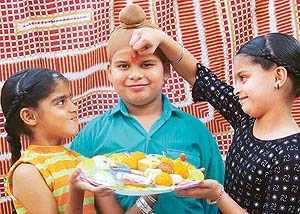5 Days Diwali Feast Ends With Bhai Dooj
The bond of love and compassion shared by brother and sister is beyond the reach of words. This love is celebrated with great grandeur and splendor in India. Hindus cherish and celebrate this beautiful relation twice a year - once at ‘Raksha Bandhan’ and the second time at ‘Bhai Dooj’.
The bond of love and compassion shared by brother and sister is beyond the reach of words. This love is celebrated with great grandeur and splendor in India. Hindus cherish and celebrate this beautiful relation twice a year – once at ‘Raksha Bandhan’ and the second time at ‘Bhai Dooj’.
Diwali is a five day celebration and the fifth or the last day is marked as ‘Bhai Dooj’ or ‘Bhaiya Dooj’. While it is known as ‘Bhai Dooj’ in Hindi, it is known as ‘Bhav-Bij’ in Marathi, ‘Bhai-Fata’ in Bengali and ‘Bhai-Tika’ in Nepal. The name ‘Bhai’ means brother and ‘Dooj’ means the second day after new moon.
 There are a few legends relating this occasion. As per one, Bahi dooj is also called ‘Yam Diwiteeya’ as it is believed that yamraj (Lord of Death and the Custodian of Hell) went to his sister, Yami’s house. She was very happy to see her brother and welcomed him with lot of warmth and love. She put the auspicious mark on his forehead for good health and well being. Yami and Yamraj then shared a meal. Yamraj was over-whelmed by his sister’s love and reception that he proclaimed that every year on this day of Bhai Dooj, if a sister applies ‘Tilak’ on his brother’s forehead then no one can harm his brother.
There are a few legends relating this occasion. As per one, Bahi dooj is also called ‘Yam Diwiteeya’ as it is believed that yamraj (Lord of Death and the Custodian of Hell) went to his sister, Yami’s house. She was very happy to see her brother and welcomed him with lot of warmth and love. She put the auspicious mark on his forehead for good health and well being. Yami and Yamraj then shared a meal. Yamraj was over-whelmed by his sister’s love and reception that he proclaimed that every year on this day of Bhai Dooj, if a sister applies ‘Tilak’ on his brother’s forehead then no one can harm his brother.
Other legend states that after slaying the mighty demon Narkasur, Lord Krishna went to his sister Subhadra. She welcomed him with lamps, sweets and applied the auspicious red Tilak on his forehead as a mark of sisterly protection.
In Jainism, it is be believed that when Lord Mahavira found Nirvana, his brother Nandivardhan was very sad and distressed. Then his sister Sudrashana comforted him.
This festival signifies familial ties and social attachments. While on Raksh Bandhan, the sister visits the brother’s house, on Bhai Dooj it is the brother’s turn and it is he, who visits the sister. This is ofcourse the case for married women and thus, these occasions bring in additional happiness for them as it is time for a famliy get together.
On Bhai Dooj, sisters apply ‘Tika’ or ‘Tilak’ on the forehead of their brothers and perform ‘Aarti’ as a mark of love and protection. They are the most genuine well-wishers and hence it is believed that their pure wishes surely bring success and happiness to their brothers. Brothers then thank the sisters for their love and concern, by giving them gifts, sweets and blessings.
This festival, thereby, projects the unfathomably deep affection that resides within brothers and sisters for each other.
To join us on Facebook Click Here and Subscribe to UdaipurTimes Broadcast channels on GoogleNews | Telegram | Signal


